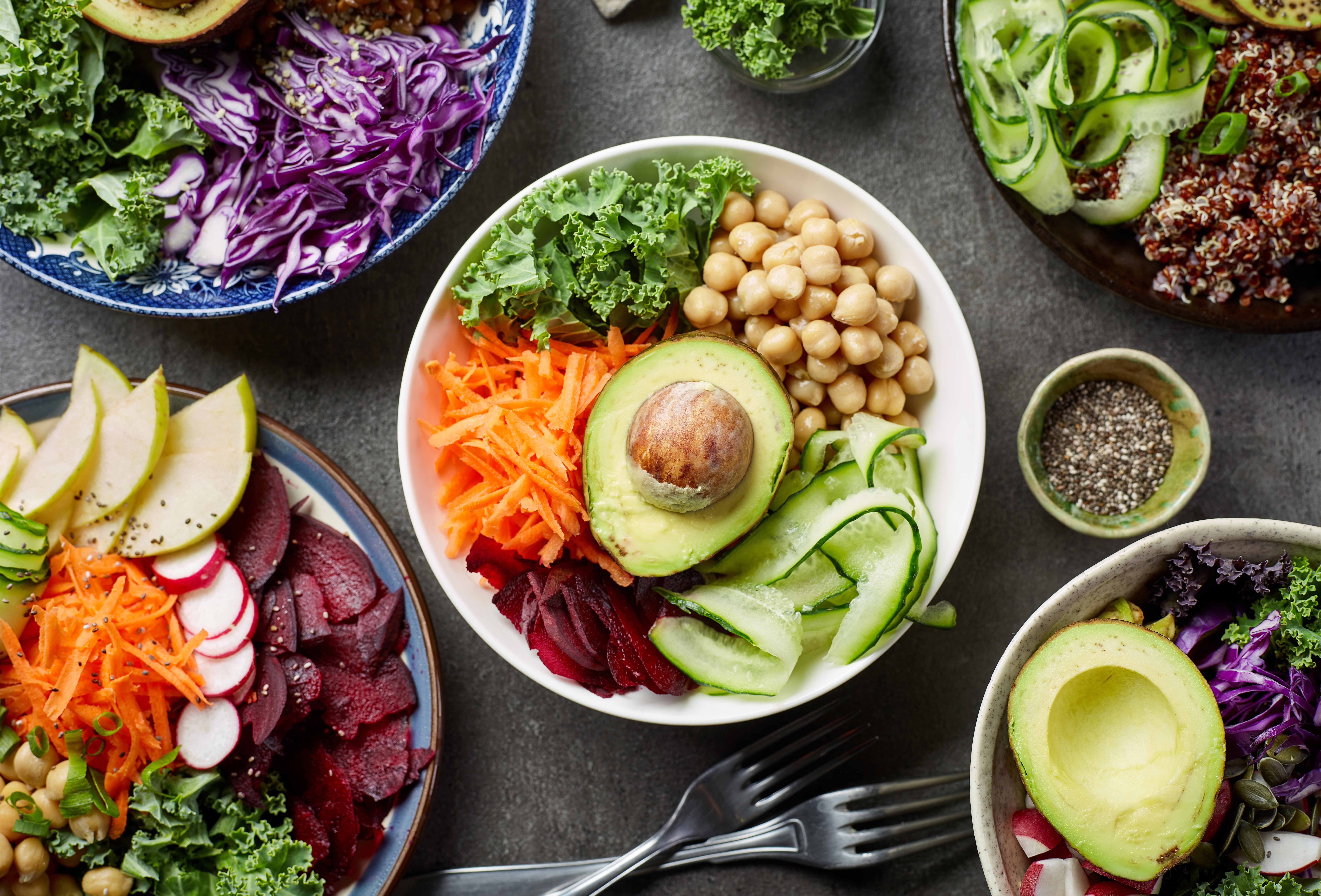As we enter a new year, we make those same old New Year’s resolutions we make every year — to lose weight and go on a diet. But, unfortunately, these health and wellness resolutions are generally highly restrictive and unsustainable. This unsustainability is why so many people keep making the same resolutions year after year.
It’s time to face the facts, “diets” don’t work! So, maybe it’s time to have a discussion on implementing a plan that will help keep you at a proper weight and healthy for life.
Table of Contents
What Does DIET Mean?
The word “diet” is derived from the Latin word “dieta,” which means “daily food allowance” and the Greek work “diaita,” which means “way of life regimen.” And “diet” is defined by Webster’s New World Dictionary (4th Ed., 2006) as “(1) what a person or animal usually eats and drinks, i.e. daily fare; or (2) a special or limited selection of food and drink chosen or prescribed to promote health or a gain or loss of weight.”
Why “Fad” Diets Don’t Work
Unfortunately, most “diets” and many weight loss programs are of the “fad” type and this is where all the problems begin for people that set their mind on following a diet. Fad diets are idiosyncratic with eating patterns that are designed to promote short term weight loss. Because of this, the end result is usually dissatisfaction, since all the weight that is lost by following the initial fad diet tends to be regained — plus some more!
Over the years, many fad diets have been popular at one time or another. Some of these diets include the Diet for Your Blood Type, the Cookie Diet, HCG Diet, and the Master Cleanse, among the litany of plans that promise amazing results.
With the proliferation of television doctors and the internet, other fad diets have also become popular in recent years. The slick advertising and marketing of these weight loss diets further promote the idea that they are the answer to the weight loss crisis. More often than not, however, they can lead to other health problems.
Blood Type Diet
The Blood Type Diet, developed by Peter J. D’Adamo, makes recommendations for the types of foods you should eat based solely upon your blood type. However, these recommendations could be harmful for people with certain underlying conditions that require them to eat a certain way. For instance, a person with diabetes that is one blood type may be told to eat high protein, while another with diabetes that has a different blood type may be told to avoid certain foods. These restrictive eating methods could conflict with their diabetes treatment plan. There are no proven long-term benefits to this way of eating and many deficiencies can result from the restrictions of this diet.
Cookie Diet
With the Cookie Diet the dieter is allowed five cookies, as a meal replacement for breakfast and lunch, and then a lean protein and veggies for dinner. Thus they take in a total of about 1500 calories a day. This is a very restrictive and unhealthy approach to dieting and it cannot be sustained long term.
Master Cleanse
When doing the Master Cleanse, or Detox Diet, you are following a detoxifying approach to weight loss, however this is not appropriate for long-term use at all. These cleansing diets often include the use of lemon juice, maple syrup, and cayenne pepper for cleansing. The type of diet lacks protein, fatty acids, and other essential nutrients and depends entirely on carbohydrates for calories.
HCG Diet
HCG, which is Human Chorionic Gonadotropin, is a pregnancy hormone that can cause headache, fatigue, irritability, and male breast growth, among other abnormalities. But the HCG diet has been popular for many years. Its claim is that you can lose weight fast, at a rate of up to one to two pounds per day, and you aren’t supposed to feel hungry in the process. However, the FDA has called this diet dangerous, illegal, and fraudulent. There is actually very little scientific evidence that it is good for healthy weight loss and control and it is a risky diet to follow.

The Common Denominator of “Fad” Diets
The biggest common denominator of “fad” diets is that they provide and imbalance in your body. By being incredibly restrictive, these imbalances can lead to cravings which lead to excessive eating and, of course, weight gain.
Inevitably, those who jump from fad diet to fad diet fall into a cycle of what is known as “yo-yo dieting.” Yo-yo dieting refers to on-again, off-again attempts at losing weight. While restrictions can temporarily lead to weight reduction in many people, once someone resumes their usual pattern of eating, the weight that was lost is regained. Oftentimes even more weight is added on, leading to serious health risks for the unsuspecting.
Why Yo-Yo Dieting is Dangerous
Many studies have shown that yo-yo dieting leads to changes in your body that make it more difficult to lose weight over time. Not only does it lead to higher body fat percentages, but it can also lead to muscle loss, fatty liver, and an increased risk of diabetes, heart disease, and high blood pressure.
Losing and gaining weight repeatedly can cause:
Reduction in Body Metabolism
With very few calories, the body reverts to a “starvation mode” in order to conserve its energy and stores. Glandular function, especially thyroid and adrenal, is adversely affected and this can become a permanent problem.
Depression
Because of the fluctuations in energy stores, this type of dieting can cause irritability, loss of motivation, and lack of energy. People with depression, or a tendency for it, can often find that yo-yo dieting puts them in serious danger of a downward spiral of depression.
Weight Gain
Hormones are disrupted with this type of dieting, as glands are not properly nourished to synthesize these vital chemicals in the body. The result is a slower rate of calorie expenditure, increased fat storage, and weight gain.
Reduced Immune Function
When cycling through weight loss and weight gain, natural defending cells are reduced which may cause infection and lead to rising cancer rates. Too many drastic “ups and downs” could weaken your immune system. This makes fad dieting a very risky practice.
Reduced Heart Function
Yo-yo dieting can cause plaque build-up which is aggravated by weight fluctuations. With blood pressure and cholesterol also being prone to more elevations, this means more risk to the dieter. It may also increase women’s risk for heart disease, according to preliminary research presented at the American Heart Association’s Epidemiology and Prevention | Lifestyle and Cardiometabolic Health Scientific Sessions 2019, a premier global exchange of the latest advances in population-based cardiovascular science for researchers and clinicians.
The Answer for Proper Body Weight and Health
So, with all this talk about how “fad diets” don’t work, what do we need to do in order to maintain a proper body weight and enjoy increased health benefits? The answer lies in our ability to make better choices for ourselves when it comes to what we put in our body.
Make Better Choices
It all starts with learning to make better choices for your health. Choose to walk past the donut shop without stopping in for a quick snack. Choose to exercise everyday instead of sitting on the couch watching the latest episode of a TV show everyone is raving about.
Choose Quality Foods
When it comes to choosing what to put in your body, choose quality, preferably organic or home-grown, foods that you can rely on for their nutrient contents. Skip the fast food and processed and packaged foods.

Don’t Skip Breakfast
Skipping breakfast will never help you! Often those who avoid eating breakfast find themselves eating non-stop for the rest of the day. Eat nuts, berries, veggies, naturally caffeine-free coffee or tea, or a fresh squeezed or prepared veggie or fruit drink to start your day right.
Watch Your Portion Sizes
Making sure that you are eating the proper amount of food. This should not be ignored! Be sure to look at your food labels (or check on the internet) to find out the serving size of the food you plan to eat. For individuals that are actively exercising or engaged in athletic activity, those serving sizes can be adjusted based on the amount of activity you do. But you should be familiar with the recommended serving sizes of foods.
Eating Lunch Matters
Just like with breakfast, it’s never a good idea to skip your mid-day lunch. Keep your lunch high in quality veggies, protein, and fat, while keeping the bread and flour products to a minimum. Flour-based foods will make you gain weight very easily. Avocados, olive oil, fish, grass-fed and antibiotic-free lean meats, seaweeds, nuts of all kinds, fermented soy (tempeh), and quality whole grains, such as rice, millet, quinoa, spelt, and oats, make for a nutritious lunch that can sustain you until dinner time.
Keep Dinner Light
Your dinner should be light and supply good protein and fat in order for you to have a restful night. Don’t eat right before bedtime unless you have no choice due to a schedule issue or emergency. It’s better to give your dinner some time to settle before you call it a night.
Don’t Cut Out All Fats
We all need high quality fats in our food intake. We can get these from nuts, seeds, whole grains, olives, avocados, coconuts, fish, and meats. When you avoid fats you can’t attain proper health. While fats from low quality junk foods and snacks should be avoided, you do need small amounts of the good fats every day. (Note: All meats have fat and protein that this writer does not advocate in general due to the myriad of hormones and other chemicals in the animal products.)
Control Your Chocolate Intake
Ahhh… chocolate – such a delightful treat! But, there really is no reason to be eating chocolate on a regular basis. A stamp-sized piece of unsweetened quality dark chocolate once in a while is okay for antioxidant purposes. But anything more should be avoided if your goal is proper health and weight control. While many claim to be “addicted” to chocolate, if you stop eating it, start eating right and start exercising the desire for chocolate will go away over time.
Did you know that exercise improves your immune system when you do it right? Ten minutes of high-energy workouts three times a day is the way to go for the best benefits.
I Just Can’t Seem To Lose Weight
Many people struggle with the thought that they just can’t seem to lose weight, no matter what weight loss program they try. That’s usually because they are in a “diet” frame of mind in a culture that is causing them to gain more weight. This is the crux of the problem. We must lose the idea of a “diet” to make long-term weight loss work.
When people are constantly “dieting” they are doing things to their body that silently sabotage their intended goals. Cutting calories drastically slows down metabolism and leads to overconsumption. It can also lead to a low functioning thyroid, a gland in your neck that controls your ability to burn calories. Dieters also find themselves not getting enough protein, which we need to function and keep weight intact.
Even if we are not specifically “on a diet,” we often make poor choices in the types of foods we put in our bodies. Poor quality fats, such as those found in fast foods and most junk snack foods are simply not good for us.
Gluten-containing and flour products can wreak havoc on the body. You must pay attention to foods containing wheat, rye, and barley, and use caution with breads, pasts, crusts, coating, cereals, breaded items, croutons, coatings, and condiments. And, above all, stay away from white bread and flour. White bread is made of a fragmented, highly processed wheat that has been drained of its nutrients, bleached, and mixed with paltry amounts of vitamins. It is terrible for your body!
Yo-yo dieting and fad diets play with our minds and bodies. Stop and plan your course sensibly for a healthier life, with less body weight to burden you as you live it.
Other Issues That Cause Weight Gain or Issues Losing Weight
While proper food and exercise are essential to maintaining proper weight and health, there can be other sources of weight gain problems that are often overlooked.
Prescription Drugs
Many prescription drugs can cause weight gain, such as antidepressants, beta blocks, anti-seizure medications, oral contraceptives and other hormone replacements, steroids, and diabetes meds. While many people must resort to these medications to deal with chronic issues, they need to pay attention. Be aware and do the best you can to ensure your lifestyle helps make it easier to control the weight.
Poor Quality Sleep
Good quality sleep is needed to help maintain proper weight and health. Leptin is a substance that is produced by the body during sleep and it plays a big role in weight control. Work to get your sleep right with natural methods and only medicate for sleep when necessary and under a doctor’s guidance. The lack of daily exercise is often one of the biggest reasons for poor sleep patterns.

Underactive Thyroid
Your thyroid gland must work properly to have optimal health. Iodine sources should be known and used daily. Good sources include fish, seaweed, pure sea salt with iodine, or an iodine supplement, especially if you take a thyroid replacement. Be sure to have your iodine levels checked regularly.
Polycystic Ovarian Disease
Women with Polycystic Ovarian Disease (POD) have a condition that causes major imbalances in the body. It’s important to check with your doctor if you have been gaining a lot of weight since adolescence, have excessive body hair, or irregular menstrual periods to be sure you don’t have POD.
Incorrect Assumptions About Your Exercise Program
Oftentimes people are fooled by slick marketing tactics. Many ads claim that by using their expensive exercise machines, you are expending more calories than you are in reality. When determining how many calories you expend, you have to factor in your sex, age, body structure, and weight. If your treadmill, elliptical, or total gym is giving you a readout of calories expended when you are using it, you can be assured that reading is generally inaccurate and misleading. It’s always better to consult with a trainer and educate yourself on the real numbers when it comes to burning off calories.
Relying On Food Label Accuracy
Diet, low calorie, sugar-free, and low-fat food labels are misleading and dangerous. Artificial sweeteners, low or no fat food items, and other chemicals can be very harsh on the body’s hormonal and glandular systems. These are not real foods at all, so they have no place in your nutrition program. So many people are seduced, enticed, and excited when they see these labels. Don’t fall for it.
Not Accounting for Alcohol Intake
Alcohol has a lot of negative effects on the body. It is also high in calories! Many people forget to account for their alcohol intake when embarking on a weight loss goal.
Drinking Your Calories
Another thing people tend to forget is the amount of sugar and calories in other things they drink such as sodas, sweet teas, vitamin waters, and juices. These are huge sources of calories, leading to weight gain. Opt to drink plain water and squeeze a bit of lemon into it for taste, or infuse it with some other good fruits. Try unsweetened hot tea with or without lemon, coconut water (plain), or small portions of a fruit-flavored beverage. Or squeeze or juice fresh fruits or veggies, or a combination of both, to quench your thirst.
Wake Up and Start Living Right!
As we embark on a new year, it’s time to remember the old saying — garbage in, garbage out. Remember that what you put into your body is what you get out of it.
Remember the old saying — garbage in, garbage out.
You can’t be healthy and have a normal sustainable body weight if your lifestyle is one that consists of nothing to your advantage. Follow this simple philosophy:
- Eat right because you care.
- Sleep when you should.
- Exercise often to maximize your health.
- And, of course, stop the fad “diets.”
Be conscious of your choices now and live a longer, happier, healthier life.
- Rethinking Your Sip: The Unfiltered Truth About Alcohol - December 22, 2025
- Consumer Beware: The Ease of Deception in the Food Industry - October 28, 2025
- The Modern Plague of Addiction: Reflections on a Painful Subject - July 29, 2025





